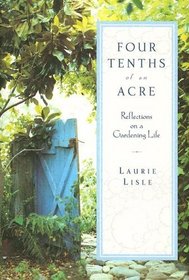Search -
Four Tenths of an Acre : Reflections on a Gardening Life
Four Tenths of an Acre Reflections on a Gardening Life
Author:
“The rituals of gardening give a rhythm, even rapture, to everyday life that is apart from the routines of writing and the flows of relationships. Tending my garden became the same as taking care of myself.” — When Laurie Lisle fled the city, she was in such a fever to buy a particular old clapboard house on the green of a historic Ne... more »
Author:
“The rituals of gardening give a rhythm, even rapture, to everyday life that is apart from the routines of writing and the flows of relationships. Tending my garden became the same as taking care of myself.” — When Laurie Lisle fled the city, she was in such a fever to buy a particular old clapboard house on the green of a historic Ne... more »
ISBN-13: 9781400061679
ISBN-10: 1400061679
Publication Date: 5/3/2005
Pages: 240
Rating: ?
ISBN-10: 1400061679
Publication Date: 5/3/2005
Pages: 240
Rating: ?
0 stars, based on 0 rating
Genres:
- Biographies & Memoirs >> Arts & Literature >> Authors
- Biographies & Memoirs >> General
- Biographies & Memoirs >> Professionals & Academics >> Journalists
- Biographies & Memoirs >> Specific Groups >> Women
- Biographies & Memoirs >> Memoirs
- Crafts, Hobbies & Home >> Gardening & Landscape Design >> General




